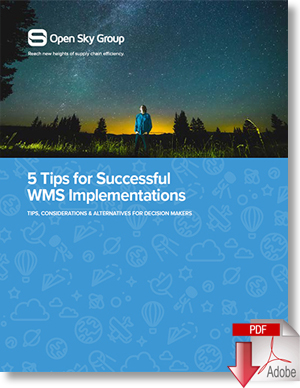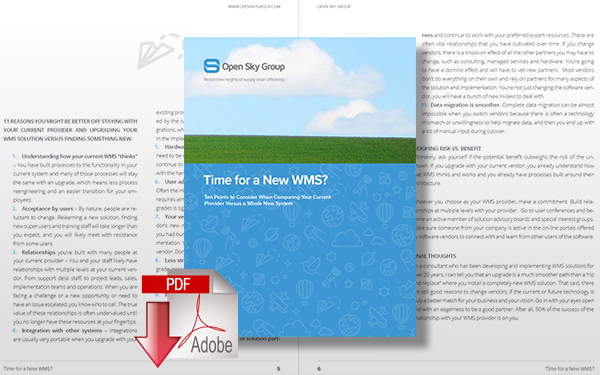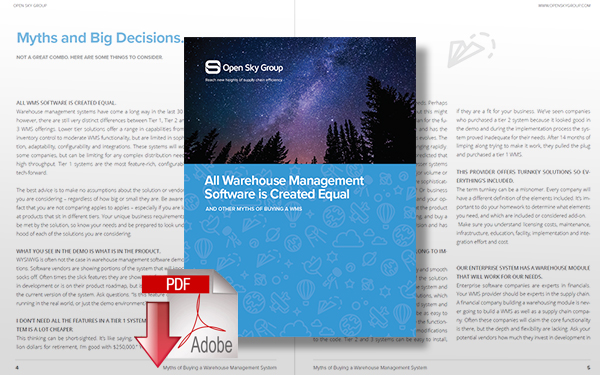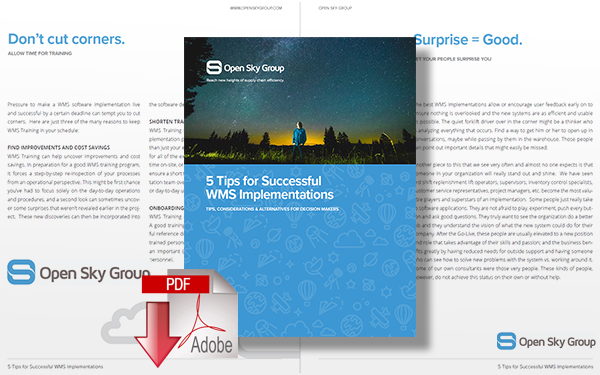Seven Qualities to Ensure a Successful WMS Implementation and Long-Term Success

Implementing new software is a challenge even with the best of software partners assisting, you will be launching a very complex project and you will never be able to assemble the perfect team for the task, so what defines a software partner?
Choosing the Right Software Partner
It’s no secret, supply chain firms run most efficiently when high-quality, purpose-built software supports their operations.
But who is behind that software? Do you really know your software partner? How do you know you’re getting the best value? How can you be sure your software partner has your best interests in mind?
To answer these questions, let’s first examine what defines a software partner vs. a software provider, implementer, or integrator.
From there, we can begin to look at the key qualities that mark a good one.
What is a Software Partner?
A software provider is someone who sells you the software itself. They give you permission to use the software and collect the associated fees. Whereas, a software implementer is the one who installs the software for you.
A software integrator, on the other hand, is someone who makes sure the software you purchased communicates with the other programs in your IT stack. They make sure your WMS communicates with your TMS, accounting system, etc. It is not unusual for one entity to provide two, or even all three of these services, at one time. That’s where the lines begin to blur.
For the purposes of this article, we’ll use the generic term “software partner” and use it to mean the entity that you purchase the software from who also implements and integrates that software.
Finding the Right Software Partner: Seven Essential Qualities
This sounds obvious but bears repeating. To ensure the best fit for your organization and project, begin by assessing the qualities of your potential software partner during the selection process. Consider these seven qualities:
1. Long-term value
Supply chain software changes rapidly in response to technological advances, so think long-term;
- Does your potential partner understand your particular technology trajectory?
- Are they capable, or have they already implemented solutions incorporating such technologies as robotics, AI, or the Internet of things?
- Are they cognizant of what’s changing in the supply chain industry and be able to bear with you into the future?
2. Support
When it comes to support, you want a partner who will be there for you when the going gets tough;
- What kind of support do they offer?
- Who answers the phone?
- What does their support structure look like?
- How do you engage?
- How do they charge?
After you meet the sales team, make sure you also get to know the support team.
3. Training
Once your product is up and running, how will your team get up to speed on the system – fast? What assets can your partner provide to teach you the software? As turnover occurs, what can they do to ensure your new hires learn the system quickly and consistently?
4. Integration
As previously mentioned, most supply chain companies run a number of different systems. Therefore, you need a partner that can ensure your new software plays well with your existing system(s), so that as orders come down through it, they get processed as quickly and efficiently as possible. Has your partner participated in integration projects before? Who have they worked with in the past? Don’t be afraid to ask.
5. Sustainability
A good software partner will do everything possible to ensure your self-sustainability. Learning the software is part of this. But, more importantly, your ability to resolve problems internally, update your system as new features and functions release, and take care of issues without waiting for hired help to come on the scene will go a long way to keeping you in the flow and self-sufficient.
6. Good Collaboration
Consider your software partner as an extension of your core team. Allow them to shoulder the project along with you and treat them with the same openness, trust, and respect you would expect from any long-term business partner. Seek out someone who is curious about your business, who asks questions, makes suggestions, and doesn’t just accept the status quo as the best possible way forward. Find someone who takes an interest in your business and mission and isn’t afraid to speak up. Make sure they comprehend your business, their business, and the road ahead.
7. Caution AND Creativity
When picking a software partner, pick one that is both cautious and creative at the same time. Cautious, in that they resist the temptation to introduce too much customization into your solution. This helps avoid getting written into an inescapable coding corner. It also avoids improperly compensating for a weakness in some other part of your process that has no business being written into the software itself. Creative, in that, they can imagine solutions within the confines of the software that extends its usefulness beyond what merely meets the eye.
Now that you have an idea of the qualities you’re looking for, what else do you need to consider when searching for the right software partner?
Focus on the Relationship
Whatever services your software partner provides, you will always get the most out of your software investment when you have a healthy relationship with your chosen partner. You want someone who will demonstrate a vested interest in your success, which only comes if you apprise them of how you define “success” in terms of clear-cut KPIs. Share your goals with your software partner, so that they can help drive the results you want. Let them know what you think needs changing and what doesn’t. Then, hold them accountable by providing clearly defined KPIs upfront. This keeps the relationship clean and honest from the start.
Plan for the Future
With supply chain operations changing all the time, you’ll want a partner who understands your technology continuum in the context of future operations. For instance, if you are a 3PL, and you have variable customer requirements for temperature-controlled vs. ambient shipping environments, you will need a software partner who first, grasps the issue and can then configure a solution that meets the changing nuances of your business.
After your software has been installed, you don’t want to see revolving costs coming in every time a new customer comes on board or a change in plans unfolds.
In short, let them know what you see coming so that they can plan with you to mitigate inevitable costs as future requirements come to light.
Check References
When talking with a potential Software Partner, ask how other companies they’ve worked for in the past are doing and what lessons they can share from their experience that might make your operation more effective. A well-versed, experienced, software partner can become an incredible research resource as you continue to improve your own business.
Let’s Make This Happen
The process of implementing new software is a challenge even with the best of software partners assisting. The truth is, you will be launching a very complex project and you will never be able to assemble the PERFECT team for the task. You can, however, assemble an excellent one.
If you properly vet your partner, communicate your goals through open discovery, take a long look at what’s ahead – for your business and your technology stack – and keep an open mind going forward. New software implementations are a part of any growing, thriving supply chain organization. Make the most of your opportunities to improve.
Hopefully, by now it’s clear that having a reliable, fully-vetted, and capable software partner can add great value to your supply chain software investment, from day one and well into the future.
Related Myths of Buying a Warehouse Management System: All Warehouse Management Software is Created Equal
Related WMS Resources
Time for a New Warehouse Management System? Ten Points to Consider
In this paper, we discuss the key elements to look for/have in a WMS provider, we also include important points you may want to consider in your evaluation of whether or not the grass is actually greener in your own yard. Download Now!
All Warehouse Management Software is Created Equal and Other Myths of Buying a WMS
In this paper, we dispel a few myths that are rife in the buying process of a warehouse management system and walk you through the process of identifying your functional needs and setting a budget in the process. Download Now!
5 Tips for Successful Warehouse Management System Implementations
This whitepaper, based on years of successful WMS implementations, offers tips for approaching, navigating, and successfully completing your Warehouse Management Systems project. Download Now!
More Resources from Open Sky Group
Article Topics
Open Sky Group News & Resources
2024 Productivity Achievement Awards Labor Management: Technology + Methods = Progress Open Sky Group launches advisory services in response to global supply chain challenges Open Sky Group and Dotcom Distribution wrap up first phase of major transformation project What You Need to Consider for a Software-as-a-Service Warehouse Management System 2021 State of Supply Chain Execution Report How Modern Logistics Companies Turn COVID Chaos into Long-Term Business Efficiency More Open Sky GroupLatest in Warehouse|DC
Talking Supply Chain: Supply chain’s watchdog Ranking the World’s 10 Biggest Supply Chains The Top 10 Risks Facing Supply Chain Professionals Walmart’s Latest Service: Ultra Late-Night Delivery Dollar Tree’s Oklahoma Distribution Center Decimated by Tornado European Parliament Passes Law on Supply Chain Accountability Transforming Warehousing with AI: Five Key Reasons to Adopt Now More Warehouse|DC


















